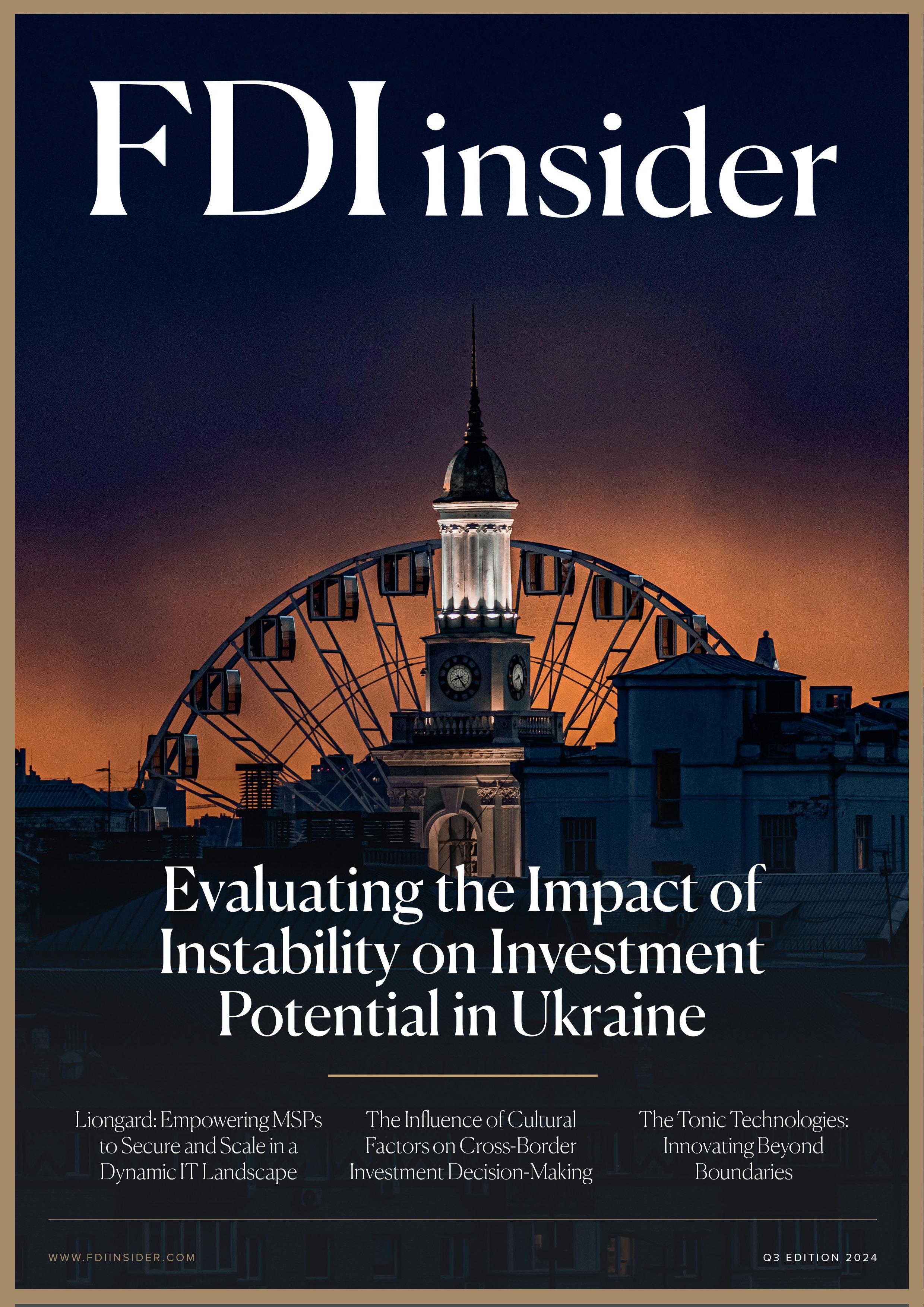










Dear Readers,
It is with great pleasure that I welcome you to the latest edition of FDI Insider magazine, where we continue to explore the evolving dynamics of foreign direct investment in a rapidly changing global economy. In this quarter’s issue, we focus on the growing importance of sustainable investments, the role of advanced technologies, and the shifting landscape of regulatory frameworks. These are crucial factors shaping the future of FDI, especially as the world embraces cleaner energy solutions, innovative financing models, and a stronger commitment to environmental, social, and governance (ESG) principles.
As global markets face increasing challenges—ranging from economic volatility to geopolitical uncertainties—FDI remains a critical driver of growth and development. Through our articles, we provide insights into how investors and countries can navigate these complexities and identify opportunities. Whether you are interested in understanding the rise of green investment hubs, the impact of renewable energy on infrastructure development, or the strategies multinational corporations are employing to expand globally, this issue has something for everyone involved in the world of FDI.
I invite you to explore this quarter’s diverse perspectives and expert analyses. As always, our goal at FDI Insider is to keep you informed, inspired, and ready to take on the future of global investments.
Brenda H Cole FDI Insider Editor







How Renewable Energy Investments Will Influence The Future of Foreign Direct Investment.
The Impact of Investment Promotion Agencies on Foreign Direct Investment Growth

Liongard: Empowering MSPs to Secure and Scale in a Dynamic IT Landscape
Mapxus: Pioneering Indoor Mapping and Navigation Solutions
Evaluating the Impact of Instability on Investment Potential in Ukraine
The Influence of Cultural Factors on Cross-Border Investment Decision-Making
Effective Risk Management in Foreign Direct Investment
Henchman: Transforming Contract Drafting with Innovative Legal Technology
The Tonic Technologies: Innovating Beyond Boundaries
Key Challenges Facing Sustainable Foreign Direct Investment 48
Enigio: Redefining the Future of Global Trade with Digital Document Innovation
The global push toward renewable energy is transforming the investment landscape, particularly in the realm of foreign direct investment (FDI). This transition, fueled by concerns over climate change, resource depletion, and the sustainability of traditional energy systems, is prompting both governments and corporations to increase investments in renewable energy technologies such as solar, wind, and hydroelectric power. As these investments grow, the flow of FDI is being reshaped by sustainability goals and the promise of cleaner, more resilient energy sources. The future of FDI will increasingly be defined by countries’ commitments to sustainable energy policies, innovations in clean technologies, and new global alliances that prioritise environmental responsibility.


Countries leading the renewable energy transition are becoming magnets for FDI, creating robust ecosystems by establishing favourable regulatory frameworks, offering incentives, and providing necessary infrastructure. Europe, with nations like Germany, Spain, and Denmark, has long been at the forefront of this shift, while the United States and China also see massive FDI flows into their renewable sectors due to ambitious climate goals and large energy markets.
Emerging economies are joining this trend, leveraging FDI to build sustainable energy systems. Countries in Latin America, Southeast Asia, and Africa are drawing investment by showcasing their untapped renewable resources. For example, Brazil’s hydroelectric potential, Chile’s solar energy resources, and Morocco’s wind farms have attracted billions in international capital. These investment hubs not only provide opportunities for foreign companies but also enhance local economies by creating jobs, fostering innovation, and improving energy security.
Conversely, countries heavily reliant on fossil fuels are experiencing a shift in FDI patterns. Traditional energy-exporting nations, particularly in the Middle East and parts of Africa, have seen a decline in foreign investment in oil and gas projects. This shift is driven by global efforts to reduce greenhouse gas emissions and the growing recognition that fossil fuels will play a diminished role in the future energy mix. Foreign investors are increasingly cautious about investing in projects that may become stranded assets as the world moves away from carbon-intensive energy sources.
This pivot presents challenges and opportunities for fossil fuel-dependent economies. While some countries struggle to diversify their energy portfolios, others, like Saudi Arabia and the United Arab Emirates, are making significant strides in renewable energy development. By attracting FDI to large-scale solar farms and hydrogen production projects, these nations are positioning themselves for a post-oil future.
In developing countries, renewable energy investment is not just a path to cleaner energy—it’s a crucial driver of economic growth. Many of these economies face significant energy deficits, hindering industrial development and limiting access to modern services. FDI in renewable energy
projects, such as solar power plants or wind farms, helps bridge this energy gap while fostering infrastructure development.
Large-scale FDI in renewable energy often leads to the development of ancillary infrastructure like transmission lines, energy storage facilities, and roads. These investments contribute to economic growth by enhancing connectivity, increasing productivity, and enabling more industries to thrive. Additionally, by improving access to affordable and sustainable energy, FDI in renewables promotes inclusive growth, ensuring that rural and underserved communities benefit from modern energy services.
Renewable energy investments significantly impact job creation in developing economies. Projects in this sector require a range of skills, from engineers and construction workers to project managers and technicians. As foreign companies invest in local renewable energy projects, they contribute to building a skilled workforce that supports the transition to a green economy. This transfer of knowledge and expertise not only boosts employment but also helps cultivate local talent in clean energy engineering and energy management.
The renewable energy sector generally offers more job opportunities than traditional fossil fuel industries due to its labour-intensive nature during construction, operation, and maintenance phases. The International Renewable Energy Agency (IRENA) estimates that millions of new jobs could be created in the renewable energy sector worldwide in the coming decades, with a significant portion emerging in developing countries.
Governments play a pivotal role in directing FDI into renewable energy by creating regulatory environments that encourage investment. Policies such as feed-in tariffs, tax credits, and public-private partnerships are crucial for attracting foreign investors. Stable, long-term energy policies signal to international investors that their investments are secure, making markets more attractive.
On the other hand, unpredictable or inconsistent energy policies can deter FDI. Investors need confidence that the regulatory environment will remain supportive throughout the lifespan of a project, often spanning several decades. A lack of clear regulations, sudden policy shifts, or insufficient financial incentives can create uncertainty and drive investors away.
Carbon pricing mechanisms, such as carbon taxes or cap-and-trade systems, also influence FDI trends in renewable energy. By assigning a cost to carbon emissions, these policies incentivize companies to invest in low-car-


bon technologies. Countries adopting carbon pricing are more likely to attract FDI in renewable energy, as clean energy projects become financially competitive with fossil fuel-based alternatives.
Emission reduction targets, as outlined in international agreements like the Paris Agreement, further shape FDI. Countries committing to ambitious emission reduction goals are more likely to see increased foreign investment in renewable energy, as international companies seek to align their operations with global climate goals.
Technological innovation is central to the renewable energy transition. Advances in solar panel efficiency, battery storage, and smart grid technology have made renewable energy more cost-effective and reliable than ever before. These breakthroughs drive new waves of FDI, as investors seek to capitalise on the growth potential of cutting-edge clean energy solutions.
Energy storage systems are particularly influential, as the ability to store energy for use during periods of low generation is critical to the widespread adoption of renewable energy. Countries investing in energy storage innovation are positioning themselves as future leaders in the energy landscape, attracting FDI from companies looking to invest in next-generation technologies.
Innovative financing models also play a key role in attracting FDI to renewable energy projects. Green bonds, for example, have become a popular way to finance clean energy projects, allowing investors to support environmentally sustainable initiatives while earning returns. Public-private partnerships and blended finance models, which combine public funding with private investment, help de-risk renewable energy projects and attract FDI to markets that might otherwise be considered too risky.
Countries that develop creative financing solutions are more likely to attract foreign investment, providing investors with a wider range of options for participating in the renewable energy transition.
The future of FDI will be deeply intertwined with the global shift toward renewable energy. As the world moves away from fossil fuels, countries prioritising clean energy development will become increasingly attractive destinations for foreign investment. This shift presents enormous opportunities for both developed and developing economies, as renewable energy investments drive economic growth, create jobs, and foster technological innovation.
In today’s rapidly evolving digital landscape, the need for robust and agile IT management has never been greater. Managed Service Providers (MSPs) are at the forefront of this challenge, tasked with safeguarding their clients’ complex IT environments while driving operational efficiency and growth. Liongard, a pioneering tech company, is redefining how MSPs approach these challenges with its cutting-edge Attack Surface Management platform. Tailored exclusively for MSPs, Liongard delivers complete visibility into IT assets, automates critical security policies, and streamlines operations—enabling MSPs to protect, manage, and scale their client environments with unprecedented ease and effectiveness.
At the core of Liongard’s offerings is its commitment to transforming the way MSPs manage IT. With over 80 integrations, the Liongard platform provides a comprehensive, interconnected solution that allows MSPs to gain full visibility into their clients’ IT assets. This visibility is not just about inventory; it extends to configuration management, change detection, and control—ensuring that every aspect of an MSP’s service delivery is informed by accurate, real-time data.
Liongard’s platform goes beyond traditional IT management tools by automating essential security and compliance tasks. This automation is a game-changer for MSPs, significantly reducing the manual workload and enabling teams to focus on more strategic, high-value activities. By automating the detection and remediation of misconfigurations and policy violations, Liongard not only enhances operational efficiency but also strengthens the security posture of its users, ensuring that their clients’ environments remain resilient against cyber threats.
The Liongard Approach: Values-Driven Innovation
Liongard’s success is deeply rooted in its core values, which guide every aspect of the company’s operations and interactions with its MSP partners. These values—Listen & Learn, Experiment & Evolve, Share & Celebrate Progress, Execute as a Team, and Teach & Lead—are not just slogans; they are the foundation of Liongard’s innovative approach to product development and customer engagement.
The company’s commitment to listening and learning from its partners is evident in its product evolution. By actively seeking feedback and staying attuned to the challenges MSPs face, Liongard continuously refines its platform to
align with the needs of the market. This customer-centric approach ensures that Liongard’s solutions are always relevant, effective, and capable of delivering tangible value.
Innovation is at the heart of Liongard’s mission. The company embraces experimentation and rapid iteration, allowing it to stay ahead of industry trends and deliver cutting-edge solutions that address the most pressing challenges in IT management. This culture of innovation is complemented by a strong emphasis on collaboration, both within the Liongard team and with its MSP partners. By working together and leveraging diverse strengths, Liongard is able to execute its vision with precision and impact.
Operating in the highly competitive MSP industry requires more than just a good product; it requires a clear differentiation that resonates with the target audience. Liongard achieves this through its exclusive focus on MSPs, rather than trying to serve a broader range of IT teams. This specialization allows Liongard to tailor its solutions specifically to the needs and challenges of MSPs, ensuring that its tools and services provide maximum impact.
Liongard’s unique selling point is its comprehensive Attack Surface Management platform, which offers unmatched IT visibility and control. The platform’s extensive integration capabilities mean that it seamlessly connects with the tools MSPs already use, enhancing their ability to manage complex IT environments at scale. This interconnected approach is a key driver of operational efficiency, enabling MSPs to deliver superior service to their clients while maintaining lean, profitable operations. Moreover, Liongard’s pla

tform automates critical tasks that are often prone to human error, such as security policy enforcement and compliance monitoring. By reducing the manual effort required to manage these tasks, Liongard not only improves the accuracy and reliability of IT management but also allows MSPs to allocate their resources more strategically. This focus on automation and efficiency directly contributes to the growth and profitability of Liongard’s MSP partners.
Liongard’s vision for the future is centered on expanding its impact within the MSP community. The company is committed to deepening its platform’s capabilities, adding new features and integrations that provide even greater value and security. By staying laser-focused on the needs of MSPs, Liongard aims to empower its partners to proactively manage their clients’ security and compliance in an increasingly complex and dynamic landscape. One of Liongard’s key strategic goals is to drive growth and profitability for its MSP partners. The company plans to continue developing solutions that not only enhance operational efficiency but also unlock new revenue opportunities. This approach ensures that Liongard’s platform remains a vital tool for MSPs looking to scale their businesses sustainably.
As Liongard continues to grow, it is also focused on fostering deeper partnerships within the MSP community. The company’s goal is to be the trusted partner that MSPs turn to for innovation, support, and insights that drive their success. This commitment to partnership is reflected in Liongard’s ongoing investment in educational initiatives, industry collaborations, and community engagement
Liongard stands out as a transformative force in the MSP industry, providing the tools and insights needed to navigate the complexities of IT management with confidence and precision. By empowering MSPs with comprehensive visibility, automated controls, and actionable insights, Liongard enables its partners to operate more efficiently, secure their clients’ environments, and fuel their business growth.
As the digital landscape continues to evolve, Liongard is well-positioned to lead the charge in helping MSPs stay ahead of the curve. With a strong foundation built on innovation, collaboration, and a deep understanding of its customers’ needs, Liongard is not just supporting MSPs—it is redefining what is possible in IT management.

FDI decisions are primarily driven by economic factors such as market potential, resource availability, and regulatory environments, however, cultural factors have become a crucial determinant in the decisionmaking process. These cultural factors include language, social norms, values, business etiquette, communication styles, and attitudes toward hierarchy. In this article, we will explore how cultural factors shape FDI decisions, impacting investor confidence, risk assessment, and the overall success of cross-border ventures.
Culture, often described as the collective programming of the mind, profoundly influences how people think, communicate, and conduct business. It encompasses values, customs, norms, and social behaviours shared by a particular group. When investors from one country enter another, they are often confronted with a different cultural context, which can affect their ability to navigate the local business environment. FDI decisions, therefore, involve not only economic analysis but also an understanding of how cultural factors might influence market entry strategies, negotiations, and operational effectiveness.
FDI decision-makers are increasingly aware that a country’s cultural characteristics can either enhance or hinder investment opportunities. For example, cultural misunderstandings or misinterpretations may lead to inefficient communication, misaligned expectations, or even conflicts, which can negatively affect the success of an investment. Therefore, multinational corporations (MNCs) and international investors must carefully consider cultural factors alongside traditional financial metrics when making FDI decisions.
One of the most immediately apparent cultural factors affecting FDI decision-making is language. The ability to communicate effectively with local partners, government officials, and employees is essential for the success of any foreign investment. Language barriers can complicate negotiations, hinder the formation of strong business relationships, and lead to misun-


derstandings that may result in costly mistakes.
However, it is not just the spoken language that matters; communication styles also differ across cultures. Some cultures, such as those in the United States and Western Europe, tend to prioritise direct and explicit communication, where clarity and precision are valued. In contrast, countries like Japan and China often rely on indirect communication, where subtlety and non-verbal cues are important, and much is left unsaid. Investors unfamiliar with these nuances may misinterpret signals or fail to grasp the full meaning of what is being communicated, leading to strategic missteps.
To mitigate these risks, many companies invest in cross-cultural training for their employees, hire local staff, or partner with local firms who have a deep understanding of the cultural landscape. This helps bridge the communication gap and fosters smoother collaboration between foreign investors and local stakeholders.
Social norms and business etiquette vary widely across cultures and can significantly impact FDI decision-making. What is considered polite and professional behaviour in one culture may be perceived as rude or inappropriate in another. For example, in many Western cultures, punctuality is highly valued in business settings, while in countries like Brazil or India, there may be more flexibility regarding time, and being a few minutes late is not considered offensive.
Understanding these cultural differences in social norms is vital for foreign investors seeking to establish successful business relationships. Failing to adhere to local business etiquette can damage trust and undermine partnerships, which are often essential for navigating regulatory environments and securing local market knowledge.
In some cultures, the concept of hierarchy is deeply ingrained in business dealings. For instance, in many Asian countries, respect for seniority and deference to authority are crucial. Investors who do
not recognize or respect these hierarchical structures may find it challenging to build rapport with local decision-makers, leading to strained relationships. On the other hand, cultures that emphasise egalitarianism, such as those in Scandinavia, value flat organisational structures where everyone’s opinion is considered, regardless of rank. Investors familiar with these dynamics can tailor their approach to ensure that they are engaging with the local culture in a manner that is respectful and conducive to success.
Cultural attitudes toward risk and uncertainty also play a significant role in FDI decision-making. Countries differ in their tolerance for risk, and this can shape how foreign investors approach market entry, expansion, and operations. For instance, cultures with a high tolerance for uncertainty, such as the United States, tend to embrace innovation, experimentation, and entrepreneurial ventures. In such environments, foreign investors may feel more confident in pursuing high-risk, high-reward strategies.
In contrast, cultures with a low tolerance for uncertainty, such as Japan or Germany, often prioritise stability, predictability, and long-term planning. Investors entering these markets may encounter more stringent regulatory requirements and a preference for conservative business strategies. Understanding these cultural attitudes toward risk is crucial for tailoring investment strategies that align with local expectations and minimise potential conflicts.
In many cultures, trust and personal relationships are critical factors in business dealings, often more so than formal contracts or legal agreements. In markets like China, India, and many Middle Eastern countries, establishing strong personal connections—often referred to as “guanxi” in China or “wasta” in the Middle East—is essential for conducting successful business transactions. Investors who overlook the importance of rela-


tionship-building in these cultures may find themselves at a disadvantage, as local partners may be less inclined to engage in business with those they do not know personally.
On the other hand, in countries where business relationships are more transactional, such as in the United States or the United Kingdom, formal contracts and legal frameworks are given more weight. While personal connections are still important, they do not carry the same level of significance as in relationship-oriented cultures. Therefore, foreign investors must adjust their approach to relationship-building based on the cultural context of the host country.
Cultural factors also influence perceptions of corporate governance and ethical standards, which can affect the attractiveness of a country as an FDI destination. In some countries, corruption and bribery may be more prevalent, while others have strict regulations that promote transparency and accountability. For example, Scandinavian countries are known for their high standards of corporate governance and low levels of corruption, making them attractive destinations for foreign investors seeking stable and ethical business environments.
Conversely, countries with weak corporate governance structures or where corruption is rampant may deter investors, despite the potential for high financial returns. Foreign investors must carefully assess the ethical landscape of the host country and ensure that their business practices align with local norms while adhering to global standards of corporate responsibility.
Cultural factors play a pivotal role in FDI decision-making, influencing everything from communication and business etiquette to risk tolerance and relationship-building. While economic considerations remain the primary drivers of FDI, understanding the cultural context of the host country is essential for minimising risks and maximising the success of cross-border investments.
In an era where time is an increasingly precious resource, Henchman, part of LexisNexis, emerges as a gamechanger for legal professionals, providing tools that redefine efficiency and quality in contract drafting. Henchman, a cutting-edge tech company, has developed a unique Microsoft Word add-in that streamlines the contract drafting process by automatically retrieving and presenting relevant precedents from a lawyer’s Document Management System (DMS). By doing so, Henchman allows lawyers to focus on the strategic and value-adding aspects of their work, rather than getting bogged down by repetitive and time-consuming tasks.
Henchman’s mission is clear: to assist lawyers in excelling at high-value tasks by leveraging technology to simplify the more mundane aspects of legal work. The platform does this by centralizing previously written clauses and definitions into a dynamic, easily accessible knowledge base. This not only speeds up the drafting process but also ensures consistency and quality across all contracts.
One of the key advantages of Henchman’s technology is its language-agnostic design, which makes it equally effective in any language. This feature, combined with the platform’s user-friendly interface and compliance with industry-leading security standards—ISO 27001 certification and SOC 2 compliance—makes Henchman a trusted partner for legal professionals around the world. The platform is also designed with GDPR considerations at its core, ensuring that user data is handled with the utmost care and confidentiality.
What sets Henchman apart in the highly competitive legal tech industry is its focus on cre-
ating data-driven lawyers and legal teams. By enriching a firm’s clause library with context and insights, Henchman empowers its users to outperform their competition. The platform not only saves time but also enhances the overall consistency and quality of contracts, enabling lawyers to rely on the collective knowledge of their teams more effectively.
Henchman’s success can be attributed to a set of core values that drive the company’s actions and decisions. These include a willingness to take bold leaps in innovation, a commitment to humility and accountability, a culture of mutual support and augmentation among team members, and an unwavering obsession with user experience. This unique blend of values not only fuels the company’s growth but also creates a vibrant and fun working environment that attracts top talent.
Recently, Henchman reached a significant milestone by being acquired by LexisNexis, a global leader in legal research and information services. This acquisition marks a new chapter for Henchman, as it combines its innovative technology with LexisNexis’s extensive database, offering us-

ers an even more powerful tool for contract drafting and negotiation. Lawyers can now access not only their internal knowledge but also third-party precedents via the LexisNexis database, further enhancing their ability to deliver top-notch legal services.
The future looks promising for Henchman as it continues to innovate and expand its offerings. The company is focused on ensuring that its users can stay ahead of the curve, adding strategic value to their clients. With the backing of LexisNexis, Henchman is well-positioned to become an indispensable tool for legal professionals worldwide, enabling them to navigate the complexities of contract drafting with greater ease and confidence.
Henchman is not just a tool; it’s a transforma-
tive force in the legal industry. By simplifying the contract drafting process and enriching it with data-driven insights, Henchman allows legal professionals to focus on what truly matters—adding value through strategic thinking and expert negotiation. As the company continues to grow and evolve, it remains committed to its mission of helping lawyers excel in their roles, making the legal profession more efficient, effective, and ultimately more rewarding. With its innovative technology and strong alignment with industry leaders like LexisNexis, Henchman is poised to continue its upward trajectory, revolutionizing the way lawyers approach contract drafting.
Foreign Direct Investment (FDI) has become a crucial driver of global economic growth, fostering the development of infrastructure, technology transfer, and economic integration. As multinational corporations, private investors, and governments seek to leverage FDI to enhance production capacity and expand market reach, understanding the nuances of investment strategies becomes increasingly important. Among the various FDI strategies, Greenfield and Brownfield investments stand out as two primary methodologies for entering or expanding in a foreign market. These approaches, while both integral to FDI, offer distinct pathways with their own set of advantages, challenges, and strategic implications.
This article explores the fundamental differences between Greenfield and Brownfield investments, delving into their unique features, advantages, and associated risks. By understanding these two investment strategies, businesses and investors can make more informed decisions, optimising their approaches to capitalise on opportunities in the global economy.
Greenfield Investments: Building from the Ground Up
Greenfield investments refer to a type of FDI where a company establishes a new venture from the ground up in a foreign country. This approach involves constructing new facilities, such as factories, offices, or plants, and setting up the entire infrastructure necessary to support
the business. Greenfield projects are characterised by significant capital investment, long-term planning, and a comprehensive understanding of the local market and regulatory environment. Key Features of Greenfield Investments
The hallmark of Greenfield investments is the creation of entirely new infrastructure. Investors typically acquire land, build facilities, and establish the necessary operational capabilities to run the business. This clean slate approach allows for full customization, enabling companies to implement the latest technology and systems, making operations more efficient and sustainable.
Greenfield investments offer investors full control over all aspects of the project. From management structures and production processes to corporate culture, everything is designed to meet the company’s specific standards. This level of control ensures consistency in quality and branding across different markets, which is particularly important for companies looking to maintain a strong global identity.
Greenfield investments often have a significant impact on the local economy. The construction of new facilities generates demand for local labor, both during the construction phase and ongoing operations. This job creation contributes to local economic growth and development, providing a strong incentive for host countries to attract Greenfield investments.

One of the primary advantages of Greenfield investments is the ability to customise facilities to meet the company’s specific needs. This ensures that operations are optimised from the start, incorporating modern technologies, sustainable practices, and efficient layouts. The result is a highly tailored operation that can better meet market demands and operational goals. Establishing new infrastructure and facilities in a foreign market allows the investor to create a strong, distinct presence. Greenfield investments contribute significantly to brand recognition and long-term customer loyalty by demonstrating the investor’s commitment to the market. This can be particularly important in
industries where brand identity and customer trust are critical to success.
While Greenfield investments often require significant upfront costs, they can lead to longterm profitability. New facilities, built with the latest technologies and designed for efficiency, often yield higher returns over time. This is especially true in rapidly growing or underserved markets, where demand for goods and services is expected to increase.
One of the most significant challenges associated with Greenfield investments is the substantial financial commitment required. Investors must allocate large sums of capital to land ac-
quisition, construction, technology, and equipment, which can strain financial resources and increase the risk if the venture does not succeed as planned.
The process of establishing a Greenfield investment can be time-consuming, often taking several years from the initial planning stages to the commencement of operations. This extended lead time delays the return on investment, which can be a disadvantage in fast-moving markets where timing is critical.
Greenfield investments often face complex regulatory hurdles, particularly in emerging markets where regulatory frameworks may be less established or more challenging to navigate. Issues such as zoning laws, labour
regulations, and environmental standards can be time-consuming and costly to address. Additionally, political instability or sudden changes in government policy can pose significant risks to the success of the venture.
Investments: Expanding on Existing Assets
In contrast to Greenfield investments, Brownfield investments involve acquiring or leasing existing production facilities, infrastructure, or businesses in a foreign market. Rather than starting from scratch, the investor takes over an already operational entity and enhances or repurposes the assets. Brownfield investments can provide a more immediate path to market entry, allowing investors to capitalise on existing resources and networks.
Key Features of Brownfield Investments
Brownfield investments typically involve the purchase or lease of established facilities, plants, or buildings. Since the infrastructure is already in place, investors can avoid the substantial costs and time associated with constructing new facilities. This allows for a more efficient allocation of resources and quicker entry into the market.
Because the facilities are already operational, Brownfield investments offer a faster route to market entry compared to Greenfield projects. Investors can leverage existing production capacity, workforce, and supply chain relationships to begin operations almost immediately after acquisition, which can be a significant advantage in competitive markets.
Potential for Upgrades and Modernization
Many Brownfield investments
focus on upgrading and modernising outdated infrastructure. Investors often invest in enhancing the technology, efficiency, and environmental sustainability of the acquired facilities, thus improving their profitability and competitiveness in the market.
One of the most significant advantages of Brownfield investments is the reduced lead time and associated costs. By acquiring an existing facility, investors can avoid the lengthy and often costly process of securing permits, constructing facilities, and setting up operations from scratch. This can result in faster returns on investment and lower overall project costs.
With a Brownfield investment, the investor often inherits an existing customer base, supply chain network, and workforce. This provides a smoother and more stable entry into the market, reducing the risks associated with building brand recognition and market presence from the ground up.
Brownfield investments offer flexibility in terms of expansion and scaling. Investors can acquire additional facilities or upgrade existing ones to meet increasing demand without undergoing the full construction process required by Greenfield investments. This adaptability can be particularly valuable in dynamic markets where demand fluctuates.
One of the most significant risks associated with Brownfield investments is the potential for legacy issues. These may include outdated technology, environmental contamination, or unre-
solved labour disputes. Investors must conduct thorough due diligence to assess the quality and condition of the acquired assets to avoid unexpected costs and liabilities.
Unlike Greenfield investments, where the investor has full control over the design and layout of the facilities, Brownfield investments come with pre-existing structures that may not align perfectly with the company’s operational needs. This lack of flexibility can hinder efficiency and profitability, particularly if the facilities require significant modifications to meet the company’s standards.
Integrating an acquired business or facility into the investor’s existing operations can present significant challenges. Differences in corporate culture, management practices, and operational processes can lead to conflicts and inefficiencies if not managed carefully. Successful integration requires a well-planned approach that considers the needs and expectations of both the investor and the local workforce.
The choice between Greenfield and Brownfield investments often depends on the strategic objectives of the investor. Greenfield investments are typically more suitable for companies looking to enter new markets with a strong emphasis on brand identity and operational control. This approach is ideal for industries where customization and advanced technology are critical to success, such as high-tech manufacturing or specialised services.
On the other hand, Brownfield investments are often preferred by companies seeking quick market entry or those looking to expand
their presence in a market where existing infrastructure and networks offer a competitive advantage. This approach is particularly advantageous in industries where speed to market is crucial, such as consumer goods or retail, where existing brand recognition and customer loyalty can be leveraged.
Risk management is another critical factor in choosing between Greenfield and Brownfield investments. Greenfield investments carry higher financial risks due to the significant capital required and the longer time horizon before generating returns. However, they offer greater control and the potential for higher long-term profitability if executed successfully.
Brownfield investments, while generally lower in initial cost and offering faster returns, come with their own set of risks, particularly related to the quality and condition of the acquired assets.
The choice between Greenfield and Brownfield investments is also influenced by market conditions and the regulatory environment in the host country. In rapidly growing or emerging markets, Greenfield investments may be more attractive due to the potential for significant longterm growth and the opportunity to establish a strong market presence from the outset. However, in more mature markets, where competition is intense and market entry barriers are high, Brownfield investments may offer a more practical and less risky alternative.
Regulatory considerations also play a crucial role. Greenfield investments often involve navigating complex regulatory frameworks, including zoning laws, environmental regulations, and labour laws. These challenges can be particularly daunting in
countries with less developed regulatory systems or where political instability poses additional risks. Brownfield investments, by contrast, may offer a more straightforward path to compliance, as the acquired facilities are likely already operating within the local regulatory framework. Greenfield and Brownfield investments represent two distinct strategies for entering and expanding in foreign markets, each with its unique set of advantages, challenges, and strategic implications. Greenfield investments offer full control, customization, and the potential for building modern, efficient operations from the ground up but require significant capital investment and involve longer lead times. Brownfield investments provide a quicker, more cost-effective route to market entry, leveraging existing infrastructure and market presence but may involve legacy issues and integration challenges.
Ultimately, the choice between Greenfield and Brownfield investments depends on a variety of factors, including the investor’s strategic objectives, financial capacity, market conditions, and risk tolerance. By carefully considering these factors and conducting thorough due diligence, investors can make informed decisions that align with their long-term goals and maximise the potential for success in the global marketplace.
As FDI continues to play a critical role in shaping the global economy, understanding the nuances of Greenfield and Brownfield investments will remain essential for businesses and investors seeking to navigate the complexities of international expansion and capitalise on the opportunities presented by a rapidly changing world.

Foreign direct investment is a cornerstone of global economic development, serving as a catalyst for job creation, innovation, and technological advancement. However, attracting FDI is a highly competitive endeavour, with countries vying to position themselves as the most attractive destinations for foreign capital. Investment Promotion Agencies (IPAs) have emerged as a key tool in this competitive landscape, with the goal of boosting FDI inflows through various strategies. But how effective are these agencies in truly driving FDI growth? This article delves into the role of IPAs, their effectiveness, and the broader context in which they operate to assess whether they are indeed the game-changers they aspire to be.
Investment Promotion Agencies are specialised entities, often established by governments, with the primary aim of attracting and facilitating investment into their respective countries. These agencies typically offer a range of services, including providing crucial information to potential investors, streamlining the investment process, offering incentives, and acting as a liaison between investors and government bodies. The emergence of IPAs can be traced back to the wave of market liberalisation that swept through the global economy in the late 20th century. As countries opened their markets to foreign investors, the role of IPAs became increasingly important in managing and promoting investment opportunities.
One of the fundamental roles of IPAs is to enhance investor confidence by offering comprehensive and reliable information about a country’s investment climate. For foreign investors, entering a new market often involves navigating unfamiliar legal, economic, and cultural landscapes. IPAs serve as a one-stop shop, providing insights into market opportunities, industry trends, regulatory environments, and economic forecasts. By offering a transparent and accessible entry point, IPAs can reduce the perceived risks of investing in a new country, thereby increasing the likelihood of attracting FDI.
The provision of accurate and timely information is critical
in building trust between investors and the host country. By simplifying the investment process and offering clear guidance, IPAs can significantly lower the barriers to entry for foreign investors. Moreover, IPAs can play a crucial role in resolving bureaucratic and regulatory challenges, which are often cited as major obstacles to FDI.
Investment incentives are a key component of the strategies employed by IPAs to attract foreign capital. These incentives can take various forms, including tax breaks, grants, subsidies, and the establishment of special economic zones (SEZs) that offer favourable conditions for investors. The rationale behind offering these incentives is to make the host country more competitive in the global market for FDI, particularly in comparison to other countries that may offer similar opportunities.
However, the effectiveness of investment incentives is a topic of ongoing debate. While some argue that incentives can distort markets and lead to a “race to the bottom,” where countries compete to offer increasingly unsustainable packages, others believe that well-designed incentives can generate significant long-term benefits. For instance, incentives that encourage investment in infrastructure or technology can lead to broader economic growth and development, thereby creating a win-win situation for both the host country and the investor.
Moreover, incentives can be particularly effective in at-

tracting FDI to specific sectors that are aligned with the country’s development goals. By targeting industries such as renewable energy, technology, or manufacturing, IPAs can help foster the development of strategic sectors that contribute to economic diversification and resilience.
Another critical function of IPAs is their role in coordinating between various stakeholders, including foreign investors, local businesses, and government bodies. Effective coordination is essential in ensuring that the interests of investors are aligned with the national development goals of the host country. By acting as intermediaries, IPAs can facilitate smoother entry and exit strategies for investors, clarify local regulations, and provide ongoing support throughout the investment lifecycle.
This bridging function is particularly important in environments where multiple government agencies may have overlapping responsibilities related to FDI. In such cases, the presence of a well-functioning IPA can help to reduce inefficiencies and prevent the confusion that might otherwise deter investors.
The effectiveness of IPAs is often measured by the level of FDI inflows that a country receives. Empirical evidence suggests that countries with active and well-resourced IPAs tend to attract higher levels of FDI. For instance, studies conducted by the World Bank indicate that countries with effective IPAs can see an increase in FDI inflows by up to 25%. However, it is important to recognize that FDI inflows are influenced by a wide range of factors, including macroeconomic stability, political risk, market size, and labour costs. Thus, while IPAs can create favourable conditions for investment, they are not the sole determinants of FDI growth.
Another metric used to assess the impact of IPAs is the growth of sector-specific FDI. IPAs often focus on promoting investment in industries that are considered strategic for the country’s economic development. For example, an IPA that successfully attracts FDI to the renewable energy sector can contribute to the country’s transition to a low-carbon economy. However, the effectiveness of sector-specific promotion can vary depending on the country’s comparative advantages and the global demand for specific goods and services.
Despite the potential benefits, IPAs face significant challenges and limitations in their efforts to attract FDI. One of the most significant challenges is political and economic instability. Investors prioritise stability when making investment decisions, and even the most well-crafted incentives or information campaigns may not be sufficient to attract FDI in an environment characterised by political volatility or economic uncertainty.
Moreover, the effectiveness of IPAs can be undermined by a lack of coordination among different government agencies. In many countries, multiple entities are involved in FDI promotion, which can lead to overlapping responsibilities, conflicting agendas, and inefficiencies.
The “race to the bottom” is another concern associated with the strategies employed by IPAs. As countries compete to attract FDI, there is a risk that they may offer increasingly generous incentives that could ultimately be unsustainable. For instance, excessive tax breaks or relaxed environmental regulations might attract short-term investment but could lead to long-term economic and social costs. This challenge underscores the need for IPAs to balance the attractiveness of their incentive packages with the broader goals of sustainable development.
The Real Impact of Investment Promotion Agencies on FDI Growth
Investment Promotion Agencies play a crucial role in the global competition for FDI, offering a range of services designed to attract and facilitate investment. While they can enhance investor confidence, streamline regulatory processes, and offer attractive incentives, their impact on FDI growth is not guaranteed. The success of an IPA depends on a variety of factors, including the overall business environment of the host country, the stability of its political and economic systems, and the effectiveness of coordination among government entities.
Ultimately, while IPAs can be effective tools in attracting FDI, they are not a panacea. Policymakers must recognize that the presence of an IPA alone is not sufficient to guarantee sustained FDI growth. Instead, IPAs should be viewed as one component of a broader strategy that includes economic reforms, infrastructure development, and efforts to improve the overall business climate. By adopting a holistic approach, countries can create a more sustainable and attractive environment for foreign investors, thereby maximising the benefits of FDI for their economies.


As the world continues to urbanize and digitalize at an unprecedented pace, the importance of smart, accessible, and sustainable indoor spaces cannot be overstated. Mapxus, a leader in indoor map data infrastructure, is at the forefront of this transformation. Specializing in indoor mapping and navigation solutions, the company is driving the digitalization of indoor environments across a wide range of industries—from shopping malls and airports to hospitals and smart buildings. With a commitment to inclusivity, innovation, and sustainability, Mapxus is not only enhancing user mobility and accessibility but also contributing to the creation of smarter, safer cities.
Founded on the core values of inclusivity, innovation, and sustainability, Mapxus offers a unique solution to the challenges of indoor navigation. The company’s AI-powered indoor digital twin platforms provide highly accurate indoor maps and positioning services that integrate seamlessly with existing infrastructure, such as Wi-Fi. This hardware-free approach enables quick and cost-effective deployments, making it easier for businesses and public spaces to adopt the technology without the need for extensive modifications.
Mapxus’s technology goes beyond simple navigation. By creating barrier-free indoor environments, the company ensures that public spaces are accessible to everyone, including those with mobility challenges. This focus on inclusivity is a cornerstone of Mapxus’s mission and aligns with global Environmental, Social, and Governance (ESG) goals. The company’s solutions support businesses in achieving their Return on Investment (ROI) targets while contributing to broader societal benefits, such as increased accessibility and reduced environmental impact.
The success of Mapxus can be attributed to several key factors, including its scalable technology, strong partnerships, and user-centric approach. With thousands of indoor maps already deployed across Asia, Mapxus has established a proven track record in delivering reliable and accurate indoor mapping solutions. The company’s ability to scale rapidly while maintaining high levels of accuracy sets it apart from competitors, enabling it to serve a diverse range of industries and applications.
Mapxus’s partnerships with governments, enterprises, and non-governmental organizations (NGOs) are also critical to its success. These collaborations allow the company to continuously innovate and enhance its offerings, ensuring that its solutions remain at the cutting edge of technology. For instance, Mapxus is one of the leading partners in the Apple Indoor Map Program, a testament to the quality and reliability of its solutions. The company has also forged strong local partnerships, such as with Kawasaki Heavy Industries in Japan and dhost Inc in Southeast Asia, to deliver large-scale implementations and ongoing service engagements.
Even during the challenges posed by the Covid-19 pandemic, Mapxus successfully deployed its solutions in over 1,000 buildings across Asia within a single year. This
resilience and adaptability highlight the company’s ability to meet the needs of its clients, regardless of external circumstances.
What truly distinguishes Mapxus in the competitive indoor mapping industry is its commitment to social impact and public safety. The company’s solutions are designed not only to enhance convenience but also to contribute to the well-being of society. By providing critical infrastructure data for building digitalization, Mapxus supports government efforts in fire safety, emergency management, and public safety. In the event of a natural disaster or other emergencies, the availability of accurate indoor maps can be life-saving, allowing first responders to navigate complex building layouts with precision and speed.
Mapxus’s focus on accessibility is also a key differentiator. The company’s barrier-free navigation solutions enable people with disabilities to navigate indoor environments with ease, promoting inclusivity and equal access to public spaces. This commitment to social responsibility is embedded in every aspect of Mapxus’s operations, from product development to customer engagement.

At the heart of Mapxus’s success is its internal culture, which is rooted in collaboration, innovation, and a shared commitment to making a positive impact. The company fosters an environment where ideas can flow freely, and every team member is encouraged to contribute their insights and creativity. This open communication allows Mapxus to stay agile and responsive in a rapidly evolving industry, ensuring that its solutions remain relevant and effective.
When it comes to talent acquisition, Mapxus looks for individuals who share its values of innovation, social responsibility, and collaboration. The company seeks out people who are not only technically skilled but also passionate about creating solutions that have a meaningful impact on society. This emphasis on cultural fit ensures that every team member is aligned with Mapxus’s mission of building a smarter, more inclusive world.
Looking ahead, Mapxus is focused on expanding its indoor mapping technology and continuing to lead in the digital transformation of indoor spaces.
The company has identified significant growth potential in markets such as Japan, Taiwan, and Southeast Asia and is actively exploring new partnerships with governments and enterprises to integrate its indoor digital twin solutions into smart city projects and public infrastructure.
In the coming years, Mapxus aims to further develop its technology to enhance real-time positioning, AI-driven analytics, and sustainability efforts. The company’s long-term vision includes expanding its role in emergency management and public safety, ensuring that its technology is used not just for convenience but to create safer, more accessible environments. Ultimately, Mapxus envisions becoming the go-to solution for indoor digitalization, empowering businesses and governments to build smarter, more resilient communities.
One of the most innovative aspects of Mapxus’s approach is its commitment to social inclusion in the creation of indoor spatial data. By developing a user-friendly software platform, Mapxus has opened up new opportunities for women, the elderly, and people with disabilities to contribute directly to the mapping of public spaces. This initiative not only fosters social inclusion but also
creates sustainable job opportunities, enabling underrepresented groups to participate in the digital transformation of their cities.
Mapxus is not just a technology company; it is a catalyst for change in the way we interact with indoor environments. By offering scalable, AI-powered indoor mapping solutions, Mapxus is driving the digital transformation of public spaces, making them more accessible, sustainable, and safe. The company’s commitment to social impact, public safety, and inclusivity sets it apart in a competitive industry, positioning it as a leader in the indoor digitalization space.
As the world moves further into the era of smart cities, the need for comprehensive building digitalization is becoming increasingly urgent. Mapxus is at the forefront of this movement, providing the tools and insights needed to create smarter, safer environments for all. With a strong foundation in innovation, collaboration, and social responsibility, Mapxus is well-positioned to lead the way in the future of indoor digital transformation.

Foreign Direct Investment has become a vital strategy for companies aiming to expand their global footprint and tap into new markets. However, as rewarding as these ventures can be, they come with significant risks that can threaten the success of the investment. From political instability and fluctuating exchange rates to complex regulatory environments, FDI presents an array of challenges that require meticulous planning and strategic management. Effective risk management is essential for protecting assets, ensuring profitability, and sustaining long-term success in foreign markets. This article explores the complexities of FDI risk management, outlining the key risks and offering strategies for mitigation.
Investing in foreign markets involves much more than just capital transfer. It requires a deep commitment to understanding and navigating a new economic landscape, which inherently carries various risks. These risks can be broadly categorised into political, economic, financial, operational, and regulatory challenges, each of which has the potential to impact the viability of an investment.
Political Risk: Navigating Instability and Uncertainty
One of the most significant risks in FDI is political risk, which refers to the potential for a country’s political environment to negatively affect investment outcomes. Political instability, such as civil unrest, changes in government, or shifts in policy, can create an unpredictable environment for foreign investors. The extreme manifestation of this risk is the nationalisation or expropriation of foreign assets, where governments seize control of private investments, leading to significant financial losses.
To mitigate political risk, investors often turn to political risk insurance, which provides coverage against events like expropriation, civil unrest, and adverse changes in government policies. Another effective strategy is to form partnerships with local firms or establish joint ventures. This alignment with domestic interests can offer a degree of protection, as the investment is perceived as beneficial to the local economy. Diversifying investments across multiple regions also reduces exposure to the political landscape of any single country, spreading the risk.
Economic risk involves the potential for changes in a country’s economic conditions—such as inflation, recession, or unemployment—to adversely affect an investment. Emerging markets, often targeted for FDI due to their growth potential, are particularly vulnerable to economic volatility. These fluctuations can lead to reduced consumer demand, increased operational costs, and difficulties in maintaining profitability.


Financial risk, closely tied to economic risk, centres on currency stability. Currency fluctuations can severely impact the value of investments, especially when a company’s revenue is earned in one currency while costs are incurred in another. Currency crises can devalue investments, leading to substantial financial losses.
Mitigating these risks requires a combination of hedging strategies, thorough economic analysis, and scenario planning. Hedging instruments like forward contracts or options can lock in exchange rates for future transactions, reducing exposure to adverse currency movements. Conducting detailed economic analyses of the target country’s landscape—examining inflation trends, interest rates, and macroeconomic indicators—enables companies to make informed decisions and anticipate potential risks. Scenario planning further prepares businesses by allowing them to model various economic outcomes and develop contingency strategies.
When entering a foreign market, operational risks often stem from unfamiliarity with the local environment. Differences in culture, communication, and business practices can create inefficiencies and challenges that hinder the success of the investment. Additionally, managing a local workforce presents its own set of challenges, including navigating labour laws, understanding cultural expectations, and ensuring that the workforce aligns with the company’s operational standards.
To overcome these operational risks, companies can leverage local expertise by forming partnerships with domestic firms or hiring local managers who have a deep understanding of the business landscape. Investing in the training and development of local staff is also crucial, as it ensures that employees are wellversed in the company’s practices and objectives. Due diligence in supply chain management is another critical aspect of operational risk management. Companies must rigorously vet suppliers and logistics partners to ensure they meet

quality standards and can adapt to operational challenges in foreign markets.
Complexities
Regulatory risk arises when changes in laws or regulations affect the business operations or profitability of an FDI. This can include taxation policies, environmental regulations, and industry-specific rules. Compliance challenges are particularly prevalent in emerging markets, where regulatory frameworks may be underdeveloped or subject to rapid change. Non-compliance with local laws can result in fines, legal disputes, and significant reputational damage.
To manage regulatory and compliance risks, companies should conduct comprehensive legal audits before entering a new market. These audits help identify potential compliance challenges
and assess how changes in laws might impact the business. Moreover, companies should adopt a flexible approach to business planning, allowing them to quickly adapt to new regulations and minimise disruptions.
Currency risk, or exchange rate risk, occurs when fluctuations in currency values affect the profitability of an FDI. For instance, if the local currency depreciates significantly, it can reduce the value of revenues when converted back into the investor’s home currency. This risk is particularly acute in volatile markets, where exchange rates can change unpredictably.
To mitigate currency risk, companies often employ hedging strategies such as forward contracts, futures, and options.

These instruments protect against unfavourable currency movements by locking in exchange rates for future transactions. Diversifying currency exposure by operating in multiple countries with different currencies also helps spread the risk across various economies.
Advances in technology have revolutionised risk management in FDI, providing companies with sophisticated tools to identify and mitigate risks more effectively. Predictive analytics, artificial intelligence (AI), and machine learning algorithms can process vast amounts of data to forecast potential risks, allowing companies to take proactive measures. These technologies enable businesses to move from a reactive to a proactive stance in risk management, improving decision-making and enhancing overall
investment outcomes.
Blockchain technology is also emerging as a powerful tool for managing FDI risks. By utilising blockchain for contracts, payments, and regulatory compliance, companies can reduce the risks associated with fraud, contractual disputes, and delays in payment. Smart contracts—self-executing contracts with the terms of the agreement directly written into code—can automatically enforce agreements and ensure that all parties meet their obligations, thus reducing legal and compliance risks.
Foreign Direct Investment offers immense opportunities for growth and profitability, but it is fraught with risks that can derail even the most well-planned strategies. Effective risk management in FDI requires a multifaceted approach that includes political risk insurance, hedging strategies, local partnerships, regulatory audits, and the use of advanced technol-
ogy. By thoroughly understanding and anticipating these risks, companies can protect their investments and position themselves for long-term success in foreign markets.
As globalisation continues to reshape the economic landscape, the importance of effective risk management in FDI will only grow. Companies that invest in robust risk management strategies will be better equipped to navigate the complexities of foreign markets, mitigate potential threats, and capitalise on the opportunities that FDI presents. The future of successful foreign investment hinges on a company’s ability to adapt to changing environments, proactively manage risks, and leverage technology to enhance decision-making and operational efficiency. Through vigilant and strategic risk management, businesses can transform potential challenges into opportunities, securing their place in the global market.
Multinational corporations (MNCs) play a pivotal role in the global economy, particularly in the realm of Foreign Direct Investment. These corporations, with their expansive operations across multiple countries, drive significant economic activity, create jobs, transfer technology, and stimulate economic growth in host countries. However, their role in FDI is multifaceted, raising questions about whether they act as powerhouses imposing their influence or partners fostering mutual development.
MNCs as Drivers of Global FDI: Economic Powerhouses
MNCs are often viewed as powerhouses in the context of FDI due to their financial strength and investment capabilities. With their vast resources and ability to access international capital markets, MNCs can undertake large-scale investments that smaller firms or local businesses cannot match. These investments can significantly influence the economies of host countries by injecting capital into key sectors such as manufacturing, energy, technology, and infrastructure.
In many cases, the entry of MNCs through FDI can have a transformative impact on a country’s economy. They bring in advanced technology, boost productivity, and enhance the competitiveness of local industries. Addition-
ally, MNCs often provide access to international markets, which can foster export-led growth in host economies.
While MNCs bring financial benefits, their sheer size and market dominance can create challenges. Due to their financial clout and global reach, MNCs can exert significant influence over the host country’s market, sometimes leading to monopolistic or oligopolistic conditions. In industries where competition is limited, MNCs may set market prices, dictate terms, and suppress smaller local firms, reinforcing their powerhouse status.
Moreover, MNCs have the ability to navigate and manipulate global supply chains, maximising profits by exploiting differences in labour costs, taxation, and regulatory standards. This power can lead
to situations where host countries become overly dependent on these corporations, limiting their economic sovereignty and flexibility in decision-making.
MNCs as Partners in Economic Development: Collaboration and Mutual Growth
While MNCs wield substantial influence, their presence in host countries can also be viewed through the lens of partnership. One of the key contributions of MNCs to host economies is job creation. By establishing production facilities, research and development centres, and service hubs, MNCs provide employment opportunities that might not otherwise exist.
Moreover, MNCs often bring advanced managerial practices, technical know-how, and training programs to local workers. This

transfer of knowledge helps improve the skill set of the domestic workforce, contributing to long-term productivity gains. In industries such as pharmaceuticals, manufacturing, and IT, the presence of MNCs has often led to the creation of highly skilled labour forces in developing countries.
Another crucial aspect of MNCs acting as partners in FDI is their role in transferring technology and promoting innovation. MNCs often introduce cutting-edge technologies and processes to host countries, which local companies and industries can learn from and adapt. This fosters a culture of innovation and can lead to significant improvements in production efficiency, product quality, and technological advancement in the host country.
In some cases, joint ventures between MNCs and local firms provide opportunities for collaborative research and development, promoting local innovation ecosystems. Through such partnerships, host countries can enhance their technological capabilities and position themselves competitively in the global marketplace.
Emerging markets often rely on FDI as a critical catalyst for economic growth and structural transformation. For these economies, MNCs act as key agents of change by bringing in capital, technology, and global market access. Countries like China, India, and Brazil have leveraged MNCs’ investments to modernise industries, build infrastructure, and boost export competitiveness.
In many cases, governments in emerging markets offer incentives such as tax breaks, regulatory easements, and subsidies to attract MNCs. While these policies help draw in foreign investment, they also place the onus on host countries to ensure that such investments are aligned with national development goals. MNCs, in turn, may have to adapt their business models to local conditions, making the relationship more symbiotic.
However, the role of MNCs in emerging markets is not without challenges. One major issue is the imbalance


of power between large MNCs and smaller local firms. In some cases, MNCs can overwhelm domestic industries, outcompeting local businesses with their financial resources, economies of scale, and global networks. This can stifle local entrepreneurship and innovation, making it difficult for homegrown businesses to thrive.
Furthermore, MNCs may engage in practices that exploit local labor markets, taking advantage of lax labor laws or environmental regulations. This raises ethical concerns about the extent to which MNCs act as true partners in development versus profit-driven entities that prioritize their own interests.
Host Country Regulations and FDI Policies
To mitigate the potential negative impacts of MNCs in FDI, host countries must implement robust regulatory frameworks. Governments can play a critical role in ensuring that MNCs operate in a manner that benefits the broader economy, respects local laws, and protects national interests.
Effective regulations should focus on promoting competition, protecting local industries, ensuring environmental sustainability, and safeguarding workers’ rights. For instance, regulations that require MNCs to engage in joint ventures with local firms can help balance the power dynamics and facilitate knowledge transfer. Taxation policies should also ensure that MNCs contribute fairly to the host country’s economy without exploiting loopholes to minimise tax liabilities.
Multinational corporations are indeed powerful players in the realm of FDI, wielding significant influence over global markets and economies. However, they are also essential partners in fostering economic development, especially in emerging markets. Their ability to provide capital, create jobs, transfer technology, and spur innovation makes them valuable contributors to global economic growth.
Foreign Direct Investment (FDI) has long been a cornerstone of global economic growth, bringing capital, technology, and expertise into host countries, which in turn stimulates economic activity and fosters development. At the heart of the FDI ecosystem are bilateral agreements—formal pacts between two nations that facilitate cross-border investment flows. These agreements, which can take various forms, such as Bilateral Investment Treaties (BITs), Free Trade Agreements (FTAs), and Economic Partnership Agreements (EPAs), provide the legal and financial frameworks necessary to protect and promote investments.significant FDI inflows between 2020 and 2022. In this exposé, we delve into the implications of this silence, dissecting why the lack of transparency is a significant concern and what it means for the affected nations and the European Union as a whole.*
This article explores the role of bilateral agreements in shaping FDI, examining several case studies to provide insights into how these agreements influence investment decisions and contribute to economic development.
Bilateral agreements are legally binding treaties signed between two countries, designed to create a stable and predictable environment for foreign investment. These agreements outline the terms under which foreign investors can operate in the host country, covering areas such as property rights, dispute resolution mechanisms, tax incentives, and investment protection. Bilateral Investment Treaties (BITs) are among the most common types of these agreements, specifically designed to promote and protect FDI by providing legal certainty. BITs reduce the risks associated with investing in foreign markets by ensuring that investors are treated fairly and equitably under local laws and regulations. They often include provisions that protect in-
vestors against expropriation without adequate compensation and offer avenues for resolving disputes between investors and the host state, such as arbitration or recourse to international courts.
Bilateral agreements play a crucial role in boosting investor confidence by mitigating political and economic risks. They offer guarantees that foreign investments will not be expropriated without fair compensation and provide mechanisms for resolving disputes, which are particularly important in countries with less stable legal frameworks. By reducing uncertainty, these agreements encourage businesses to invest in foreign markets, especially in developing economies where regulatory frameworks may be less established or more volatile.
Furthermore, bilateral agreements often include provisions for the repatriation of profits, which is a significant incentive for multinational compa-


nies. The ability to transfer profits back to the investor’s home country without facing exorbitant taxes or other barriers is crucial for ensuring the attractiveness of FDI. By offering these protections, bilateral agreements help create a more predictable and secure environment for investors, which can lead to increased foreign investment and, consequently, economic growth in the host country.
To better understand the impact of bilateral agreements on FDI, it is useful to examine specific case studies where these agreements have played a significant role in facilitating cross-border investments.
States and South Korea: The U.S.-Korea Free Trade Agreement (KORUS FTA)
The U.S.-Korea Free Trade Agreement (KORUS FTA), signed in 2012, provides a compelling example of how bilateral agreements can stimulate FDI. This agreement not only reduced tariffs and trade barriers between the two countries but also established a robust legal framework to promote investment. By ensuring fair treatment for investors and reducing the risks associated with cross-border investments, KORUS FTA significantly boosted FDI flows between the United States and South Korea.
In the years following the signing of KORUS FTA, U.S. companies increased their direct investments in South Korea, particularly in sectors such as technology, automotive, and services. Major corporations like General Motors and Ford expanded their presence in the South Korean market, capitalising on the lowered barriers to entry and the protections offered by the agreement. This influx of investment not only supported the growth of these companies but also contributed to the overall economic development of South Korea by creating jobs and fostering technological advancements.
Conversely, South Korean firms such as Samsung and Hyundai expanded their operations in the United States, investing in manufacturing plants, research centres, and other facilities. This two-way flow of investment has bolstered economic ties between the two nations, demonstrating how
bilateral agreements can create win-win situations for all parties involved.
China’s investment in Africa has grown exponentially over the last two decades, driven by a combination of natural resource acquisition and infrastructure development. Much of this investment has been facilitated by bilateral agreements between China and various African nations, which provide the legal protections and guarantees necessary for Chinese companies to operate in these markets.
One of the most notable examples is the bilateral agreement between China and Ethiopia, which has facilitated large-scale investments in Ethiopia’s manufacturing and infrastructure sectors. This partnership has led to the creation of industrial parks, the expansion of transportation networks, and significant job creation, all of which have been instrumental in driving Ethiopia’s industrialization efforts.
For China, these investments have provided access to Africa’s rich natural resources and emerging consumer markets, which are crucial for sustaining its economic growth. By securing bilateral agreements that protect their investments, Chinese companies have been able to mitigate the risks associated with operating in relatively unstable environments, ensuring that their investments are both secure and profitable.
While bilateral agreements have undoubtedly played a significant role in promoting FDI, they are not without their challenges and criticisms. These concerns often center around the unequal power dynamics between developed and developing nations, as well as the mechanisms used to resolve disputes between investors and host governments.
One of the primary criticisms of bilateral agreements is that they often favour wealthier, more developed nations at the expense of smaller, developing economies. Multinational corporations from developed countries may use these agree-


ments to extract favourable terms, such as tax holidays or exemptions from environmental regulations, which can have negative long-term effects on the host country’s development.
Furthermore, there are concerns that these agreements may undermine a country’s ability to regulate foreign investment in sensitive sectors, such as energy, natural resources, or national security. In some cases, governments may be pressured to prioritise the interests of foreign investors over those of their citizens, leading to a loss of sovereignty and potentially adverse outcomes for the local population.
A common feature of many bilateral agreements is the Investor-State Dispute Settlement (ISDS) mechanism, which allows foreign investors to take legal action against the host government if they believe their rights under the agreement have been violated. While ISDS is intended to provide a neutral forum for resolving disputes, it has been criticised for being biased in favour of investors and against host governments, particularly those in developing countries.
Governments may find themselves embroiled in costly and lengthy legal battles, even if their actions are in line with national interests or environmental protections. This has led to concerns that ISDS mechanisms could dissuade governments from implementing regulations that might be perceived as detrimental to foreign investors, even when such regulations are necessary for the public good.
Despite the challenges associated with bilateral agreements, they remain a vital tool for facilitating FDI and fostering economic growth. However, as the global economic landscape continues to evolve, there is a growing recognition of the need to address some of the criticisms associated with these agreements and to adapt them to better reflect contemporary economic realities.
Shifting Focus to Multilateral Agreements
In recent years, there has been a shift to-
wards multilateral agreements as countries seek to broaden their investment networks and create more comprehensive frameworks for trade and investment. Multilateral frameworks, such as the Comprehensive and Progressive Agreement for Trans-Pacific Partnership (CPTPP), offer a more uniform legal environment for investors, reducing the need for individual bilateral agreements and creating a more predictable and stable environment for cross-border investments.
While bilateral agreements will likely continue to play a significant role, particularly in regions where multilateral agreements are still under negotiation or where specific partnerships between two countries are particularly important, the trend towards multilateralism reflects a broader recognition of the benefits of a more integrated global economy.
As global attention increasingly turns toward sustainability and responsible investment, there is a growing movement to incorporate environmental, social, and governance (ESG) standards into bilateral agreements. Countries are now including clauses related to environmental protection, labour rights, and corporate social responsibility in their treaties, ensuring that foreign investment contributes to sustainable development rather than exacerbating inequality or environmental degradation.
This shift reflects the growing recognition that FDI should not only focus on profit but also on the long-term well-being of the host country. By integrating sustainability into bilateral agreements, countries can attract investment that aligns with their broader development goals, creating a more balanced and equitable approach to economic growth.
Bilateral agreements have proven to be essential in facilitating FDI, offering legal protection, reducing risks, and encouraging cross-border investments. The case studies of the U.S.-Korea FTA and China’s investment in Africa highlight the profound impact these agreements can have on both developed and developing economies.
Standing out in a competitive industry requires more than just good ideas—it demands innovation, a deep understanding of market needs, and a commitment to delivering value that resonates with users. The Tonic Technologies, a forward-thinking tech company, has mastered this art by developing innovative mobile and web-based solutions that help businesses and individuals tackle everyday challenges with a touch of creativity and a focus on user experience.
Founded on the principle of transforming problems into opportunities, The Tonic Technologies has carved out a niche for itself in the tech world, particularly within the African market. Their solutions — with a cumulative total of 2,200,000+ downloads across iOS and Android devices — cater to businesses as well as individuals, ranging from user-friendly payment remittance platforms, to gift card solutions, cross-border financial systems, and intuitive e-commerce platforms for everyday use. But what truly sets them apart is their unwavering commitment to making technology not only functional but also engaging and enjoyable to use.
At the heart of The Tonic Technologies’ success is a clear and compelling mission: to craft purposeful solutions that address real-world challenges. The company’s approach is deeply customer-centric, focusing on creating experiences that feel natural and enhance the daily lives of its users. This philosophy is evident in every project they undertake.
When embarking on a new project, The Tonic Technologies takes a personalised approach. They begin by diving deep into understanding the unique challenges and goals of their clients, whether they are businesses or individual customers. This thorough understanding allows them to tailor their solutions to meet the specific needs of each customer. The process is collaborative, with open communication and ongoing support to ensure that everything runs smoothly from start to finish.
This personalised approach, combined with their exper-
tise in technology, allows The Tonic Technologies to turn challenges into growth opportunities for their clients. Whether simplifying complex processes like payment remittance or developing user-friendly e-commerce platforms, their solutions are designed to be both effective and delightful to use. In addition, their B2C offerings empower everyday consumers with layman-friendly financial and tech solutions that make their daily transactions smoother and more enjoyable.
In a highly competitive industry, The Tonic Technologies distinguishes itself through a unique blend of creativity, expertise, and a relentless focus on the customer. While many tech companies are content with merely building functional products, The Tonic Technologies goes a step further by ensuring their solutions are also fun and easy to use for both businesses and regular everyday users. This dedication to accessibility and enjoyment is what sets them apart in a crowded market.
The company’s success can also be attributed to its strong internal culture. The Tonic Technologies fosters a working environment that balances professionalism with playfulness, encouraging creativity, collaboration, and continuous learning.
With a team of over 100 passionate individuals, the company is driven by a shared love for innovation, and a commitment to customer-centeredness. This culture is a key factor in attracting top talent who not only pos-

sess the necessary skills but also align with the company’s values.
Looking ahead, The Tonic Technologies is positioned for continued growth. With plans to expand its product offerings and explore new markets, particularly in payment solutions and e-commerce for both businesses and individuals, the company is focused on staying at the forefront of tech trends. Their commitment to customer satisfaction and their ability to adapt to changing market needs position them well for future success.
Making a significant impact on individual lives is central to The Tonic Technologies’ mission. This distinguishes The Tonic Technologies from other tech companies—an unwavering commitment to fostering positive change within the communities they serve.
The company is heavily involved in initiatives that support education, technology, and economic empowerment. One of their standout programs is the Upskill Program, which has provided tech enthusiasts across Nigeria with 35 free MacBooks, enabling them to pursue their passions and develop their skills.
Additionally, The Tonic Technologies’ CardtonicCares Outreach has backed multiple local non-profits within Nigeria, impacting over 2,500 families. These initiatives are not just corporate social responsibility—they are a core part of the company’s identity and reflect their belief in the power of technology to drive positive change.
As The Tonic Technologies looks to the future, their vision remains clear: to continue delivering solutions that make a tangible difference in the lives of their clients. By focusing on simplicity, functionality, and a healthy sprinkle of fun, they invite everyone—from businesses to individual consumers—to experience technology that truly works for them.
The company’s expansion plans are ambitious, with a particular emphasis on scaling their impact in the payment solutions and e-commerce sectors. By leveraging their strengths in innovation and customer-centric design, The Tonic Technologies is well-positioned to lead the charge in transforming everyday challenges into opportunities for growth and improvement for both businesses and everyday users.
The Tonic Technologies is not just another tech company; they are a partner to the businesses and individuals they serve. Their commitment to delivering solutions that are both functional and enjoyable to use, coupled with their dedication to
community impact, sets them apart as a leader in the tech industry. As they continue to innovate and grow, The Tonic Technologies is poised to make an even greater impact in the years to come.

Ukraine’s geopolitical significance has been dramatically magnified since Russia’s invasion in 2022. This conflict has not only reshaped Ukraine’s political landscape but also brought far-reaching economic implications. The protracted conflict, combined with a historical legacy of corruption and economic instability, poses significant challenges to investment in the country. However, understanding the nuanced impacts of this instability on investment potential requires an in-depth analysis of several factors, including the current economic environment, the state of reforms, and the broader geopolitical context.
The Current Economic Environment in Ukraine
Ukraine’s economy has been severely disrupted by the ongoing war. In 2023, the country’s GDP was estimated at $150.6 billion, reflecting a dramatic contraction due to the conflict. The World Bank projects that the pace of recovery will slow to 3.2% in 2024, down from 4.8% in 2023, largely due to a smaller harvest and a persistent labour shortage exacerbated by the war. Poverty levels have escalated, with over 9 million Ukrainians now living in poverty—a significant increase since the onset of the conflict. These economic challenges are further compounded by the need for substantial international support to maintain essential public services and to initiate reconstruction efforts.
Despite these challenges, Ukraine has shown remarkable resilience. The government has managed to maintain public services, and substantial international support has been provided for reconstruction. For instance, in 2023, $1 billion was allocated for housing repairs, and significant progress was made in restoring educational institutions. These efforts are critical for stabilising the country’s economy, but they also highlight the massive investment required to rebuild
and modernise Ukraine’s infrastructure. The scale of destruction in Ukraine is unprecedented in its modern history, requiring both immediate humanitarian aid and long-term economic recovery plans. The ongoing conflict has not only reduced Ukraine’s economic output but has also disrupted global supply chains, especially in agriculture and energy sectors, where Ukraine has been a significant player. The global ramifications of the war extend beyond Ukraine’s borders, contributing to economic uncertainty and inflationary pressures worldwide.
Political instability in Ukraine remains a major deterrent to foreign investment. The ongoing war has created a high-risk environment where uncertainty reigns, making it difficult for investors to commit substantial capital. The threat of renewed military escalation remains high, with both sides preparing for potential future offensives. This instability threatens not only the physical safety of investments but also complicates the legal and regulatory environment, making it challenging to enforce contracts and protect investor rights.
Corruption, which has long plagued
Ukraine, further exacerbates these risks. Despite ongoing efforts to reform and improve transparency, the legacy of corruption remains a significant hurdle. Investors are often wary of entering markets where the rule of law is weak and where political influence can interfere with business operations.This culture of corruption is deeply embedded, and while reforms are being implemented, the pace is slow, and the impact on investor confidence remains limited.
Moreover, the ongoing conflict has exacerbated these governance challenges. With vast areas of the country under siege or occupied, the central government’s control over national territory is compromised, further complicating the enforcement of laws and regulations. In this context, investors face a dual challenge: navigating a war-torn environment where the physical security of assets cannot be guaranteed and dealing with a governance system that is still struggling to root out corruption and inefficiency. This duality makes the investment landscape in Ukraine particularly precarious.
Reform is critical to improving Ukraine’s

investment climate. The Ukrainian government, with the backing of international partners, has initiated several key reforms aimed at addressing corruption, improving the business environment, and enhancing legal protections for investors. These reforms are essential not only for attracting foreign direct investment (FDI) but also for ensuring that such investments contribute to sustainable economic growth.
However, the success of these reforms is heavily contingent on the broader political and security situation. The war has significantly strained the government’s capacity to implement and enforce these reforms. Moreover, political instability creates an unpredictable environment that can undermine the effectiveness of even the most well-designed policies. For Ukraine to attract and sustain investment, it will need to continue working towards a stable and transparent political environment where the rule of law is upheld.
International support plays a crucial role in this reform process. The European Union, the United States, and other Western
allies have provided financial aid, technical assistance, and political support to help Ukraine stabilise its economy and implement necessary reforms. However, the continuation of this support is not guaranteed, particularly if the conflict drags on without a clear resolution. The international community’s patience is not infinite, and continued aid will likely be contingent on Ukraine demonstrating real progress in governance reforms and anti-corruption measures.
While the overall investment climate in Ukraine is fraught with challenges, there are specific sectors that offer significant opportunities for investors willing to navigate the risks. The agricultural sector, for instance, remains a cornerstone of Ukraine’s economy and presents substantial potential for growth. Ukraine is one of the world’s largest exporters of grain, and investment in modernising agricultural infrastructure could yield considerable returns. However, this sector is not without its challenges, particularly given the extensive damage to
farmland, logistical networks, and storage facilities caused by the war. Moreover, ongoing military operations in agricultural regions add a layer of risk that investors must carefully assess.
The energy sector is another area of potential, particularly in renewable energy. Ukraine has abundant natural resources that can be harnessed for green energy, which aligns with the global shift towards sustainability. The potential for wind, solar, and biomass energy is significant, given Ukraine’s geographic and climatic conditions. However, this sector also faces significant risks due to the ongoing conflict, which threatens infrastructure and complicates the development of new projects. Additionally, the energy sector in Ukraine has been historically plagued by corruption and inefficiency, which pose further challenges for potential investors. Despite these obstacles, the strategic importance of energy independence—particularly in light of the ongoing conflict with Russia—may drive both domestic and international efforts to invest in and develop Ukraine’s renewable energy sector.


Infrastructure development is perhaps the most critical area for investment. The war has caused extensive damage to Ukraine’s infrastructure, creating a vast need for reconstruction. Roads, bridges, railways, and public buildings have been destroyed or severely damaged, and rebuilding these will require significant investment. International donors and private investors have already begun engaging in rebuilding efforts, but the scale of the required investment is immense. Successful investment in this sector will depend heavily on the security situation and the effectiveness of governance reforms.
The geopolitical context surrounding Ukraine significantly impacts its investment potential. The war in Ukraine is part of a broader global shift towards a multipolar world, where geopolitical risks are becoming more prominent in investment decisions. This shift marks the end of a period of relative stability that followed the Cold War, during which investors could operate with a degree of confidence in the global order.
The broader geopolitical implications of the war in Ukraine extend beyond the immediate conflict zone. The global realignment of alliances, the intensification of great power competition, and the growing importance of economic and military blocs all have a direct bearing on Ukraine’s future. For investors, this means that FDI decisions in Ukraine cannot be made in isolation; they must be considered within the broader context of global geopolitical trends. The risk of sanctions, trade restrictions, or even military escalation in the region requires a level of geopolitical analysis that goes beyond traditional market assessments.
Moreover, the war in Ukraine has underscored the fragility of global supply chains and the interconnectedness of economic and security concerns. Investors in Ukraine must navigate not only the risks associated with the local environment but also the potential ripple effects of global economic sanctions, shifts in energy markets, and changes in international trade policies. This adds a layer of complexity to investment decisions, requiring a deep understanding of both regional dynamics and global economic trends.
Ukraine’s investment potential is inextricably linked to its geopolitical and economic context. While the ongoing conflict poses significant challenges, there are also opportunities for investors who can navigate the complexities of the environment. The agricultural, energy, and infrastructure sectors offer particular promise, but they are not without risks, including the potential for further conflict, corruption, and the uncertain pace of reforms. As the global geopolitical landscape continues to evolve, investors must weigh the potential rewards of investing in Ukraine against the significant risks, considering both local and international factors in their decision-making process.
In a world where global trade is increasingly digital, the persistence of paper documents remains a paradoxical challenge. Enter Enigio, a pioneering tech company that is leading the charge in solving what it calls the “Paper Paradox.” By offering a revolutionary solution called trace:original, Enigio is transforming the way businesses handle critical documents, making them secure, verifiable, and fully digital without the need for altering existing processes.
Founded with a mission to create a global standard for the consistency, integrity, and traceability of digital information, Enigio has developed a patented SaaS technology that promises to reshape the landscape of global trade. Enigio’s trace:original allows for the complete digitalisation of any document, turning them into secure digital assets that are possessable, transferable, and easily integrated into existing workflows. This innovation is particularly significant in sectors such as banking, logistics, and trade finance, where the need for original documents has traditionally been a barrier to full digital adoption.
The strength of trace:original lies in its ability to replace the need for printing physical paper documents—such as documents of title, negotiable instruments, and certificates of origin—with electronic versions that are fraud safe,legally recognized, and freely transferable. This digital transformation not only streamlines processes but also contributes to a more sustainable world by reducing the reliance on paper and the carbon emissions associated with its production and transportation.
Enigio’s success can be attributed to several key factors, chief among them being the quality and security of its product. The trust and reputation the company has built with Tier 1 banks, major corporates, and logistics providers are testaments to the effectiveness of trace:original. Enigio’s clients include some of the most reputable names in global trade, who rely on the solution to manage their most critical documents and data.
The company’s commitment to its core values—trust, transparency, and sustainability—has also played a crucial role in its growth. Enigio has built a culture of integrity and expertise, ensuring that every solution it delivers meets the highest standards of security and reliability. The company’s structured approach to project management, which includes agile de-
velopment practices, rigorous testing, and ongoing customer support, ensures that clients achieve their desired outcomes efficiently and effectively.
Enigio’s team is composed of experts in distributed ledger technology, cryptography, e-archiving, and trade — fields that are critical to the development and implementation of trace:original. This deep well of knowledge and experience enables Enigio to set the highest standards for its products and services, ensuring that they are not only innovative but also practical and scalable.
In an industry crowded with digital solutions, Enigio sets itself apart with its innovative technology and mission-driven approach. Unlike other solutions, such as platforms that may require extensive onboarding or platform sign-ups, trace:original offers an open solution that is accessible to all parties in a transaction. Once a document is created using trace:original, it can be transferred to any party without the need for them to sign up or integrate with a specific platform. This flexibility is a significant advantage for businesses looking to future-proof their operations without overhauling their existing systems.
Enigio’s solution is also fully compliant with key legislative frameworks, including the English Electronic Trade Documents Act and the UNCITRAL Model Law on Electronic Transferable Records. This compliance ensures that trace:original not only meets legal standards but also provides a reliable and legally recognized method for handling digital documents across different jurisdictions.
The broad applicability of trace:original is another key differentiator. While Enigio’s current focus is on digitalising global trade and trade finance, the solution is completely industry-agnostic and can be adapted for any business that requires the secure transfer of trustworthy information and assets. This versatility

makes trace:original a valuable tool for a wide range of industries, from banking and logistics to government and certification bodies.
Basically, there is no need to print documents anymore, instead they can be created as trace:original documents, as long as the applicable legislation is technology neutral.
Enigio’s purpose-driven culture is one of its strongest assets. The company fosters a collaborative and inclusive environment where innovation is encouraged, and integrity is paramount. Each person values this unique opportunity to be part of a global team that is solving a significant problem in a clever way. This culture not only drives the company’s success but also attracts top talent who are aligned with Enigio’s mission and values.
When recruiting new team members, Enigio looks for individuals who bring diverse skills and a shared belief in the company’s vision. The company values lifelong learners who are dedicated to achieving excellence and contributing to a sustainable future. This focus on building a strong, mission-driven team has been instrumental in maintaining Enigio’s position as a leader in the digitalisation of trade documents.
Enigio’s vision for the future is expansive. The company plans to continue advancing its technology, with a focus on further digitalising global trade and trade finance. However, the potential applications of trace:original extend far beyond these sectors. Enigio envisions a future where its technology is used across all types of document flows, enabling the secure transfer of infor-
mation and assets in B2B, B2C, B2G, and G2G interactions.
One of the core messages that Enigio aims to convey is that digitalisation does not require a complete overhaul of existing processes. Instead, businesses can begin by replacing the printing of paper documents with the creation of digital originals, then gradually streamline and improve their processes over time. This approach not only makes digitalisation more accessible but also allows businesses to adapt at their own pace.
Enigio is poised to play a pivotal role in solving the Paper Paradox on a global scale. With billions of paper documents still being sent around the world every day, the shift to digital originals represents a significant opportunity for businesses to enhance efficiency, reduce costs, and contribute to a more sustainable planet.
Enigio is not just a technology provider; it is a catalyst for change in the way businesses handle their most critical documents. By offering a secure, flexible, and compliant solution for digitalising trade documents, Enigio is enabling businesses to transition seamlessly from paper to digital, without sacrificing security or process integrity.
As the world moves toward greater digitalisation, Enigio’s trace:original stands out as a solution that not only meets the needs of today’s businesses but also anticipates the demands of tomorrow’s global trade landscape. With a strong foundation in innovation, expertise, and a commitment to sustainability, Enigio is well-positioned to lead the way in the digital transformation of global trade and beyond.
Sustainable Foreign Direct Investment has emerged as a crucial component in the global push toward sustainable development. By aligning investment strategies with environmental, social, and governance (ESG) criteria, sustainable FDI aims to generate positive outcomes that extend beyond mere financial returns. However, the path to widespread adoption of sustainable FDI is fraught with challenges that need to be carefully navigated. These challenges, if left unaddressed, can significantly impede progress toward achieving the global sustainability goals outlined in the United Nations’ Sustainable Development Goals (SDGs).
A robust regulatory framework is essential for creating an enabling environment that attracts and facilitates sustainable FDI. However, the reality is that many countries, particularly in the developing world, lack the necessary policies and institutions to support such investments. This gap poses a significant barrier to the growth of sustainable FDI, as investors are often hesitant to commit capital in environments where the rules are unclear, inconsistent, or poorly enforced. One of the primary regulatory challenges is the lack of standardised ESG criteria across different jurisdictions. Without uniform standards, it becomes difficult for investors to assess the sustainability of their investments consistently. This inconsistency can lead to a situation where companies engage in “greenwashing,” portraying their investments as more sustainable than they truly are to meet varied regulatory requirements. To combat this, international cooperation is needed to develop standardised ESG criteria that can be universally applied, allowing for clearer benchmarks and more reliable assessments of sustainable investments.
Moreover, many developing countries
struggle with weak institutional capacity, which hampers their ability to enforce existing environmental and social regulations. Corruption, lack of transparency, and limited technical expertise further exacerbate these challenges, making it difficult for governments to hold investors accountable for meeting sustainability standards. Addressing these issues requires comprehensive institutional reforms, capacity-building initiatives, and greater transparency in governance to ensure that regulatory frameworks can effectively support sustainable FDI.
In addition to these challenges, the inconsistent application of regulatory frameworks can lead to uncertainty, which is a significant deterrent to potential investors. Investors are more likely to commit capital in countries where they can predict outcomes based on a stable and transparent legal environment. Therefore, enhancing the predictability and reliability of regulatory frameworks through international standards and local capacity building is vital to fostering sustainable FDI.
Another significant challenge to sustainable FDI is the high upfront cost asso-
ciated with many sustainable projects, particularly in sectors such as renewable energy, sustainable infrastructure, and green technology. These projects often require substantial initial capital investments, which can be a deterrent for investors, especially in markets where financial resources are limited or where the perceived risks are high.
For instance, the development of renewable energy infrastructure—such as wind farms, solar power plants, and hydroelectric facilities—requires significant investment in technology, land, and equipment. While these projects can offer long-term financial and environmental benefits, the initial costs can be prohibitive. This is particularly true in developing countries, where access to capital markets is often restricted, and where the cost of borrowing can be relatively high due to perceived risks associated with political instability or economic volatility. To address these financial challenges, innovative financing mechanisms are essential. Public-private partnerships (PPPs) and blended finance models, which combine public and private funding sources, have emerged as critical tools in bridging the financing gap for sustainable projects. PPPs allow governments and private investors to share the risks and rewards of sustainable investments, making it more feasible to un-
dertake large-scale projects that would be difficult to finance through private investment alone.
Blended finance, on the other hand, involves the strategic use of public funds to mobilise additional private capital for sustainable investments. By de-risking projects through the provision of guarantees, subsidies, or concessional financing, blended finance can attract private investors who might otherwise be deterred by the high upfront costs. Moreover, international financial institutions, such as the World Bank and the International Finance Corporation (IFC), play a crucial role in providing financial support and technical assistance to countries seeking to attract sustainable FDI.
Furthermore, there is a growing recognition of the need for financial innovation to make sustainable investments more attractive and viable. Instruments such as green bonds, social impact bonds, and sustainability-linked loans are increasingly being used to channel funds into projects that meet ESG criteria. These financial products not only provide capital but also signal a commitment to sustainability, thereby enhancing investor confidence and market credibility.
Technological advancements are a key driver of sustainable development, enabling more efficient resource use, reducing environmental impact, and improving social outcomes. However, the adoption of advanced technologies in developing countries is often hampered by several factors, including limited access to technology, inadequate infrastructure, and a lack of technical expertise.
For sustainable FDI to thrive, it is essential to address these technological barriers. Developing countries need support in building the necessary infrastructure to adopt and implement green technologies. This includes investments in renewable energy grids, sustainable transportation systems, and waste management facilities. Additionally, there is a need for capacity-building initiatives that equip local workers and businesses with the skills required to operate and maintain new technologies effectively.
Furthermore, technology transfer from developed to developing countries is critical in overcoming these challenges. Multinational corporations investing in sustainable projects should be encouraged to share their technological expertise with local partners, fostering innovation and enhancing the overall sustainability of their investments. International agreements and partnerships can facilitate this process by providing frameworks for technology transfer, intellectual property rights protection, and collaborative research and development.
However, technology transfer alone is not enough. It must be accompanied by efforts to adapt technologies to local conditions and needs. In many developing countries, the direct importation of foreign technology may not be feasible due to differences in climate, infrastructure, and economic context. Therefore, fostering local innovation through research and development is crucial. By adapting technologies to the local context, sustainable FDI can become more effective and aligned with the specific needs of the host country.
Sustainable FDI does not occur in a vacuum; it is deeply influenced by the socio-political dynamics of the host country. Investors must navigate complex local contexts, including cultural norms, political stability, and social expectations, all of which can impact the success of sustainable investments.
One of the key challenges in this regard is ensuring that sustainable FDI benefits local communities and aligns with their development priorities. In many cases, foreign investors may prioritise projects that offer high returns but do not necessarily address the most pressing needs of the local population. This can lead to tensions between investors and local communities, particularly if projects are perceived as exploitative or if they result in environmental degradation or social displacement.
To mitigate these risks, investors must engage in meaningful dialogue with lo-

cal stakeholders, including government officials, community leaders, and civil society organisations. This engagement should begin at the planning stage and continue throughout the life of the project, ensuring that local perspectives are considered and that investments contribute to inclusive and sustainable development.
Moreover, political stability is a critical factor in the success of sustainable FDI. Countries with unstable political environments are often perceived as highrisk, deterring investment and making it difficult to attract the capital needed for sustainable projects. Investors must carefully assess the political risks associated with a particular market and consider strategies such as political risk insurance or partnering with local entities to mitigate these risks.
In addition, understanding and respecting cultural norms and practices are essential for the successful implementation of sustainable investments. For example, in many regions, land ownership is governed by traditional practices that may not align with formal legal systems. Ignoring these practices can lead to conflicts and undermine the legitimacy of the investment. Therefore, investors must take a culturally sensitive approach, ensuring that their activities respect local customs and contribute to the well-being of the communities involved.
Market dynamics and competitive pressures also play a significant role in shaping the landscape of sustainable FDI. In highly competitive markets, the pressure to deliver short-term financial returns can sometimes conflict with the long-term sustainability goals of a project. This tension can lead to a focus on cost-cutting measures that undermine the sustainability of an investment, such as reducing environmental safeguards or compromising on labour standards.
To counteract these pressures, investors need to adopt a long-term perspective that prioritises sustainability as a core component of their business strategy.
This involves integrating ESG criteria into investment decision-making processes and setting clear sustainability targets that are aligned with the broader goals of the host country and the global community.
Additionally, investors can leverage their sustainability commitments as a competitive advantage. As consumers and stakeholders increasingly demand greater transparency and responsibility from businesses, companies that demonstrate a strong commitment to sustainability are likely to benefit from enhanced brand reputation, customer loyalty, and access to new markets.
Furthermore, governments can play a pivotal role by creating incentives for sustainable investments and penalising unsustainable practices. Through policies such as tax breaks, subsidies for green technologies, and stricter environmental regulations, governments can help align market dynamics with sustainability goals, making it easier for responsible investors to compete and succeed.
International cooperation is crucial in addressing the challenges of sustainable FDI. Given the global nature of many sustainability issues—such as climate change, biodiversity loss, and social inequality—no single country or investor can tackle these challenges alone. Multilateral institutions, international agreements, and cross-border partnerships are essential in creating the conditions for sustainable FDI to thrive.
Moreover, international development agencies and financial institutions play a pivotal role in supporting sustainable FDI by providing technical assistance, capacity-building, and funding to developing countries. By working together, these organizations can help create the enabling conditions needed to attract and sustain high-impact investments that drive sustainable development.





